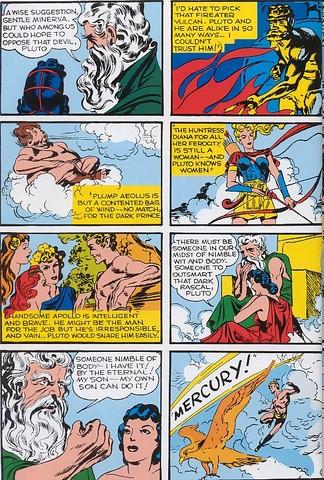What is more interesting is that the Mercury strip also has themes that would recur over twenty years later in The Mighty Thor, a strip in which the Norse God of Thunder becomes a superhero, themes that include the father-son relationship between the divine hero and the chief deity, and the chief villain being another god (in Mercury, Pluto, in Thor, Loki). In Origins of Marvel Comics, Kirby's collaborator in the 1960s, Stan Lee, gives an account of Thor's origins that makes it all his idea, and implies that this was the first time a mythological deity had become a superhero. This is disingenuous on a couple of counts. Firstly, Lee himself had been involved in writing a superheroic version of the goddess Venus in the late 1940s, and had written a story where she confronted the Norse god Loki.
Secondly, though Lee has always presented the classic Marvel characters such as the Fantastic Four and the Hulk as emerging straight from his own head, and then farmed out to appropriate artists, it is now generally accepted by most critics that on those titles created by Lee and Kirby, the ideas were at least 50% Kirby - The Fantastic Four, for instance, derives many ideas from a strip Kirby wrote and drew for rival publisher DC, The Challengers of the Unknown. (Kirby himself claimed that Lee was merely an administrator and had no creative input to the stories, a claim I feel goes too far and denies Lee credit he deserves.) I have always suspected that of all the Lee/Kirby creations from the sixties, Thor, even more than the FF, is the one that is most Kirby and least Lee. This is because the mythological themes recur constantly in Kirby's work after his partnership with Lee ended. Most obviously this can be seen in the Fourth World saga (Mister Miracle, Forever People and New Gods) he created for DC in the early 1970s. But the themes are also in The Eternals, a series he created for Marvel in 1976, that in some ways was simply the New Gods played at a different speed, but also riffs off Greek and Meso-American mythology, work Kirby was doing at the same time in a comic based on Stanley Kubrick's 2001: A Space Odyssey, and his sixties work in Thor and the Galactus stories from FF. It strengthens my opinion to find that Kirby was playing with mythology as early as 1940.
There are also similarities with the way the Roman gods are depicted in Wonder Woman, another strip that blended anti-Nazism with classical mythology. It would be interesting to know if William Moulton Marston, Wonder Woman's creator, was aware of this strip - he was certainly aware of Captain America.
Finally, I just want to share this image with you.

Jupiter is running through all the gods,wondering who he can send to oppose Pluto, rejecting them all for one reason or another. At his side is Minerva, goddess of wisdom and war, wielder of the aegis, who brought the matter up in the first place - and I like to imagine she is thinking, "pick me, you silver-haired ninny!"
1 comment:
I have fond memories of reading a late 1960's or early 1970's reprint of this story.
Post a Comment